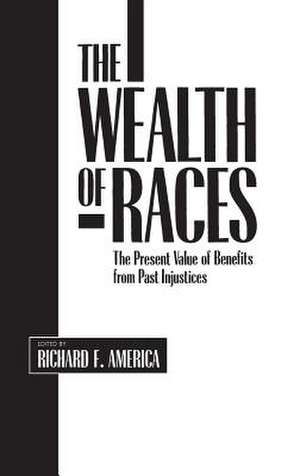The Wealth of Races: The Present Value of Benefits from Past Injustices: Contributions in Afro-American and African Studies: Contemporary Black Poets
Autor Richard F. Americaen Limba Engleză Hardback – 23 aug 1990 – vârsta până la 17 ani
Din seria Contributions in Afro-American and African Studies: Contemporary Black Poets
- 28%
 Preț: 458.81 lei
Preț: 458.81 lei - 27%
 Preț: 363.98 lei
Preț: 363.98 lei - 24%
 Preț: 458.99 lei
Preț: 458.99 lei - 28%
 Preț: 363.64 lei
Preț: 363.64 lei - 28%
 Preț: 436.99 lei
Preț: 436.99 lei - 28%
 Preț: 437.91 lei
Preț: 437.91 lei - 19%
 Preț: 179.25 lei
Preț: 179.25 lei - 24%
 Preț: 363.89 lei
Preț: 363.89 lei - 24%
 Preț: 462.20 lei
Preț: 462.20 lei - 24%
 Preț: 461.95 lei
Preț: 461.95 lei - 24%
 Preț: 458.41 lei
Preț: 458.41 lei - 27%
 Preț: 364.65 lei
Preț: 364.65 lei - 34%
 Preț: 465.50 lei
Preț: 465.50 lei - 35%
 Preț: 362.37 lei
Preț: 362.37 lei - 28%
 Preț: 498.90 lei
Preț: 498.90 lei - 28%
 Preț: 461.35 lei
Preț: 461.35 lei - 24%
 Preț: 460.83 lei
Preț: 460.83 lei - 28%
 Preț: 436.57 lei
Preț: 436.57 lei - 24%
 Preț: 460.43 lei
Preț: 460.43 lei - 27%
 Preț: 345.42 lei
Preț: 345.42 lei - 28%
 Preț: 434.53 lei
Preț: 434.53 lei - 30%
 Preț: 638.78 lei
Preț: 638.78 lei - 28%
 Preț: 462.79 lei
Preț: 462.79 lei - 24%
 Preț: 461.35 lei
Preț: 461.35 lei - 28%
 Preț: 437.24 lei
Preț: 437.24 lei - 28%
 Preț: 436.73 lei
Preț: 436.73 lei - 28%
 Preț: 437.07 lei
Preț: 437.07 lei - 27%
 Preț: 438.93 lei
Preț: 438.93 lei - 28%
 Preț: 463.05 lei
Preț: 463.05 lei - 28%
 Preț: 437.40 lei
Preț: 437.40 lei - 28%
 Preț: 436.47 lei
Preț: 436.47 lei - 38%
 Preț: 437.47 lei
Preț: 437.47 lei - 28%
 Preț: 434.71 lei
Preț: 434.71 lei - 24%
 Preț: 362.72 lei
Preț: 362.72 lei - 24%
 Preț: 462.79 lei
Preț: 462.79 lei - 28%
 Preț: 436.40 lei
Preț: 436.40 lei - 24%
 Preț: 362.21 lei
Preț: 362.21 lei - 24%
 Preț: 460.83 lei
Preț: 460.83 lei - 38%
 Preț: 346.74 lei
Preț: 346.74 lei - 28%
 Preț: 344.58 lei
Preț: 344.58 lei - 24%
 Preț: 462.87 lei
Preț: 462.87 lei - 27%
 Preț: 346.25 lei
Preț: 346.25 lei - 38%
 Preț: 437.67 lei
Preț: 437.67 lei - 27%
 Preț: 439.51 lei
Preț: 439.51 lei - 28%
 Preț: 462.12 lei
Preț: 462.12 lei - 27%
 Preț: 467.27 lei
Preț: 467.27 lei - 28%
 Preț: 344.38 lei
Preț: 344.38 lei - 30%
 Preț: 508.80 lei
Preț: 508.80 lei - 27%
 Preț: 439.44 lei
Preț: 439.44 lei - 27%
 Preț: 346.57 lei
Preț: 346.57 lei
Preț: 493.07 lei
Preț vechi: 705.88 lei
-30% Nou
Puncte Express: 740
Preț estimativ în valută:
94.35€ • 100.89$ • 78.67£
94.35€ • 100.89$ • 78.67£
Carte tipărită la comandă
Livrare economică 17 aprilie-01 mai
Preluare comenzi: 021 569.72.76
Specificații
ISBN-13: 9780313257537
ISBN-10: 0313257531
Pagini: 240
Ilustrații: Illustrations
Dimensiuni: 156 x 235 x 14 mm
Greutate: 0.51 kg
Editura: Bloomsbury Publishing
Colecția Praeger
Seria Contributions in Afro-American and African Studies: Contemporary Black Poets
Locul publicării:New York, United States
ISBN-10: 0313257531
Pagini: 240
Ilustrații: Illustrations
Dimensiuni: 156 x 235 x 14 mm
Greutate: 0.51 kg
Editura: Bloomsbury Publishing
Colecția Praeger
Seria Contributions in Afro-American and African Studies: Contemporary Black Poets
Locul publicării:New York, United States
Caracteristici
Delves into the history of racial inequality in the United States, focusing on the Black experience
Notă biografică
RICHARD F. AMERICA is a policy analyst in Washington, D.C. He is coauthor of Moving Ahead: Black Managers in American Businessand author of Developing the Afro-American Economy.
Cuprins
IntroductionOverview and SummaryForty Acres and a Mule: Placing a Price Tag on OppressionEconomic History and the Current Benefits and Costs of SlaveryPast History and Current Policy: The Legacy of SlaveryWho Pays for Slavery?An Appraisal of the Estimated Rates of Slave ExploitationSlavery and the Economics of DiscriminationBlack Labor in the American Economy since Emancipation: What Are the Legacies of History?A Calculation and Comparison of the Current Benefits of Slavery and an Analysis of Who BenefitsEstimated Present Value of Income Diverted during SlaveryBlack Exploitation and White Benefits: The Civil War Income RevolutionSlave Exploitation in Neoclassical Economics: Criticism and an Alternative DirectionAchieving Racial Equality through RestitutionRacial Inequality and ReparationsAn Illustrative Estimate: The Present Value of the Benefits from Racial Discrimination, 1929-1969Income Transfers: Are They Compensation for Past Discrimination?The Social Debt to Blacks: A Case for Affirmative ActionWhat Was Lost: The Cost of Slavery and Discrimination for BlacksAchieving Parity through ReparationsConclusionsSelected BibliographyIndex











